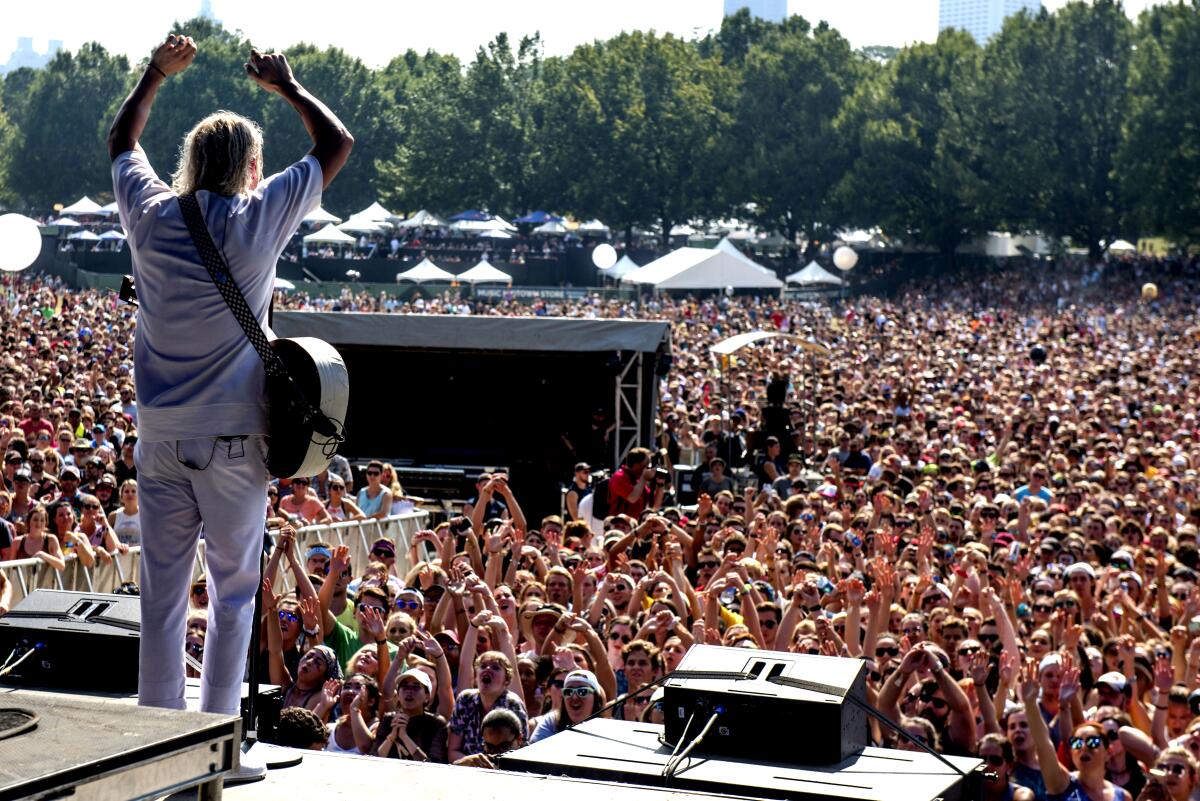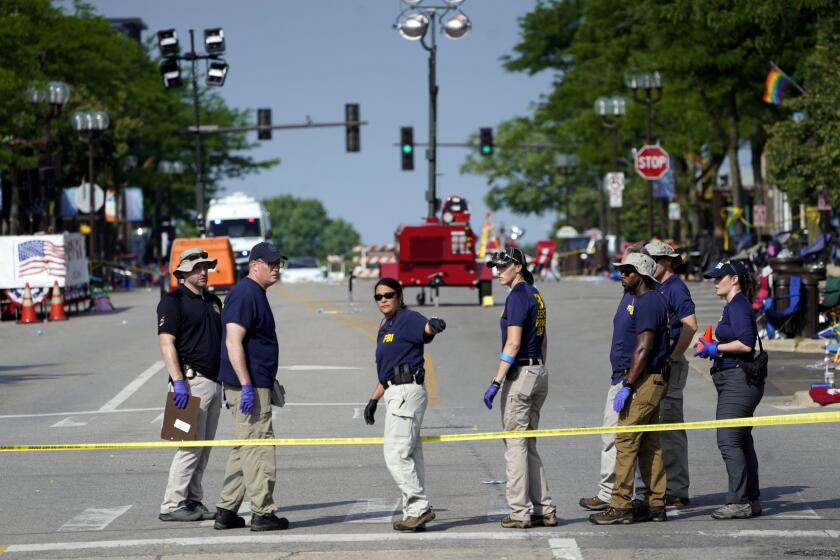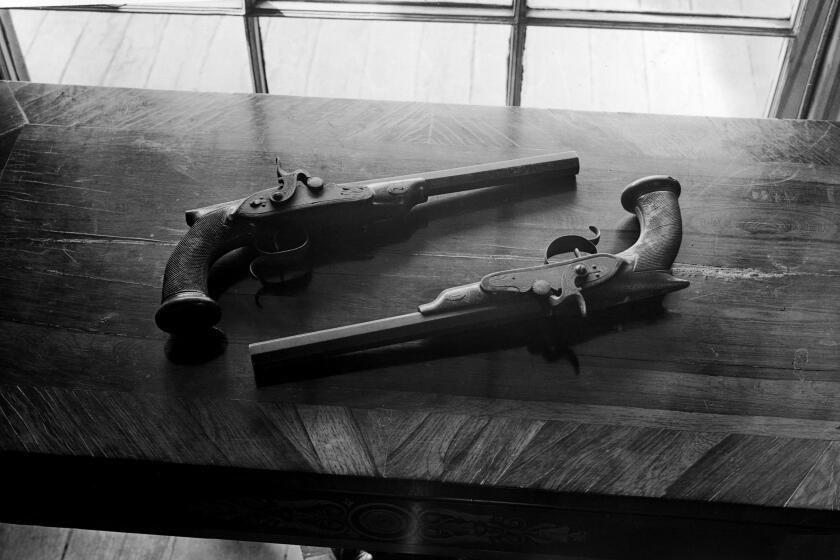What can cities do when bad gun laws are hurting the economy?

- Share via
Bad gun laws have claimed yet another victim, but not the kind you might be thinking of. This year’s Music Midtown Festival in Atlanta was recently canceled because the organizers believed Georgia law did not allow them to prohibit firearms at the event. The cancellation might have saved lives, but it cost the local economy an estimated $50 million. And there may have been a way to hold the festival while still allowing organizers to prohibit firearms at the event.
The cancellation of the Music Midtown Festival occurs at the intersection of two legal truths regarding gun law restrictions: Private landowners can exclude people with firearms, but cities and counties in Georgia cannot restrict firearms on public land. The music festival fell somewhere in between. It was going to be held in a public park that festival organizers had rented for two days. According to the lease, the festival could exclude people without tickets, but under recent Georgia case law, the festival could not exclude people carrying guns.
We can derive several important lessons from the cancellation of the festival. The first lesson is narrow: Georgia case law is plainly wrong. Any time the government temporarily transfers to a private party or entity the right to exclude others from a public space, that right should include the right to exclude people with firearms (no less than wedding crashers). The space is private, not public, for the duration of the lease.
The broader issue extends well beyond Georgia. State laws severely limit the ability of local governments to regulate firearms. In nearly every state, cities and counties are preempted from regulating guns — only the state can do that. This preemption principle hamstrings cities such as Atlanta that are located in more conservative states from enacting ordinances that restrict gun use.
Even an extreme reading of the 2nd Amendment doesn’t override the 1st Amendment.
However, partial privatization of public land in this circumstance can provide a solution to this problem. Private landowners are not preempted by state law from prohibiting firearms on their property. My right to bear arms stops at your property line.
Short-term “privatization” through a lease could have solved Atlanta’s music festival problem. Although the Atlanta City Council cannot decide to ban guns in its parks because of state law, it is free to enter into a short-term lease — renting the park to a private party.
The council could have made it clear that the rental also transferred to the festival organizers the right to decide who could enter the event. Even in Georgia, with its misguided case law, cities have the right to transfer short-term ownership rights in land to private parties. The privatization approach has already been applied in Missouri.
In 2017, the entertainment district of Westport, a small neighborhood in Kansas City, was facing a public safety and public relations nightmare. The number of gun-related weapons offenses had risen from 16 in 2016 to 65, and consumers were shying away from the district’s concentration of restaurants and bars. To make matters worse, a new Missouri state law allowing anyone to carry concealed weapons without a permit in nearly every public space had gone into effect earlier in 2017. Westport’s restaurants and bars could prohibit patrons from carrying weapons onto their premises, but there was nothing they or the city council could do to keep armed pedestrians from carrying weapons on the public sidewalks and streets.
Westport used the tool of privatization. The district’s businesses lobbied the city council to sell them a two-block stretch of sidewalks in the core entertainment district. While state law allows pedestrians to carry weapons on public streets and sidewalks, Westport businesses could prohibit weapons on private sidewalks by requiring visitors to pass metal detectors on weekend nights and during festivals. After the “sidewalk privatization” proposal went into effect in late 2018, gun-related offenses in that area dropped dramatically when the security screenings were in place.
As the Supreme Court nears another decision on guns, Americans should consider how restricted carrying arms in public was in the early days of the country.
The Westport example shows that privatization doesn’t have to mean excluding the general public from an area. It just gives a private party a sufficient property interest to make a decision about whether guns are allowed there.
The privatization approach has added importance after the Supreme Court’s recent 2nd Amendment decision. New York is trying to defend its ban on firearms in Times Square by arguing that it is a “sensitive location” sufficiently analogous to the kinds of laws “forbidding the carrying of firearms in sensitive places such as schools and government buildings,” for which the Supreme Court has signaled its approval. But there is uncertainty over whether the Supreme Court will uphold as constitutional gun bans in entertainment districts.
Partially privatizing these public spaces avoids this uncertainty, by giving a private party the final say. The 2nd Amendment stops government from unduly infringing the right of the people to keep and bear arms. It doesn’t stop private property owners from choosing to keep their spaces — even if temporarily leased — gun free.
Ian Ayres and Fredrick Vars are law professors at Yale University and the University of Alabama, respectively, and co-authors of the book “Weapon of Choice: Fighting Gun Violence While Respecting Gun Rights.”
More to Read
A cure for the common opinion
Get thought-provoking perspectives with our weekly newsletter.
You may occasionally receive promotional content from the Los Angeles Times.











